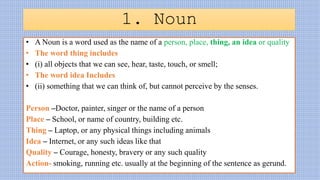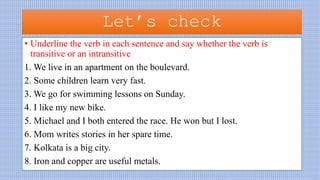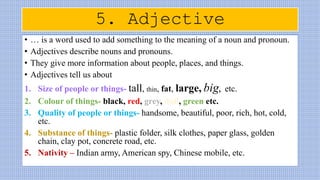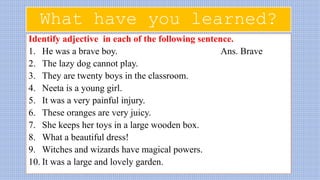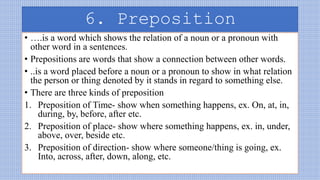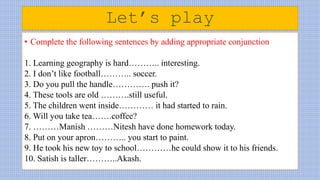Parts of Speech.pptx
- 1. Parts of Speech Prepared By - Milan Parmar Assistant Professor (M.Phil., GSET, NET) Government Science College- Veraval Bhakta Kavi Narsinh Mehta University
- 2. What is Parts of Speech? • Words are divided into different kinds or classes, called Parts of Speech, according to their use; that is, according to the work they do in a sentence.(Wren and Martin) • Elements/unit of a sentence which can be referred as Parts of Speech. • Partition of sentence according to its uses is called parts of speech. • There are eight parts of speech….
- 3. • Interjecti on • Conjuncti on • Pronoun • Noun Verb Adverb Prepositi on Adjective
- 4. 1. Noun • A Noun is a word used as the name of a person, place, thing, an idea or quality • The word thing includes • (i) all objects that we can see, hear, taste, touch, or smell; • The word idea Includes • (ii) something that we can think of, but cannot perceive by the senses. Person –Doctor, painter, singer or the name of a person Place – School, or name of country, building etc. Thing – Laptop, or any physical things including animals Idea – Internet, or any such ideas like that Quality – Courage, honesty, bravery or any such quality Action- smoking, running etc. usually at the beginning of the sentence as gerund.
- 5. Types of nouns • Proper noun – Is a name of person or thing or place. Ex. Gita, Sahil, march, Bombay, Delhi.) • Common noun - is name given in common to every person or thing of the same class or kind. Ex. book, boy, city, girl, river, table, tree, village • Collective noun - is the name of a number (or collection) of persons, or things taken together and spoken of as one whole. Ex. assembly, audience, army, class, committee, crew, crowd, family, government, group, nation, parliament, public, team • Material noun - denotes the matter or substance of which things are made. Ex. - copper, cotton, ‘gold, milk, oil, silver, sugar, water, wood, wool etc. • Abstract noun - is usually the name of a quality, action or state considered apart from the object to which it belongs Ex. honesty, anger, joy, courage, growth, discovery, race, childhood, boyhood, adulthood, poverty, Astronomy, Economics, Geometry
- 6. Let’s check Identify the underlined nouns, what they refer to 1. Akbar was a great king. Ans. A person 2. India is a large country. Ans. 3. This is my car. Ans. 4. Honesty is the best policy. Ans. 5. Smoking is injurious to health. Ans. 6. Poverty is our real enemy. Ans. 7. The camel is the ship of dessert. Ans. 8. Without health there is no happiness. Ans. 9. The Taj Mahal stands on the bank of Yamuna. Ans.
- 7. 2. Pronoun • A word used instead of a noun is called pronoun. • There are several types of pronouns …. 1. Personal Pronouns- Subject or the object of the sentence, for ex. Subject- I, you, he, she, it, we and they, object- me, him, her, us and them. 2. Reflexive pronouns - word that refers to the noun or pronoun that is the subject of the verb, for ex. myself, yourself, himself, herself, itself, ourselves, yourselves and themselves. 3. Possessive Pronouns - used to talk about things that belong to people, for ex. mine, yours, his, hers, ours and theirs. 4. Indefinite pronouns- does not refer directly to any other word, for ex. Each, everybody, many, most, all, everyone, anyone, few, etc. 5. Demonstrating Pronouns- used for pointing out things, for ex. This, that, those, these.
- 8. • Identify the underlined pronouns 1. This book is mine. Ans. Possessive Pronoun 2. We can do better than that. Ans. 3. Everybody is welcome at the meeting. Ans. 4. This pen is mine and that one is his. Ans. 5. The book are where you left them. Ans. 6. Goodbye, children! I’ll call you later. Ans. 7. The children cleaned their room all by themselves. Ans.
- 9. 3. Verb • is a word used to express an action or state of subject or object • word that tells what someone or something does • an action word or word of being • Verbs can be divided into two groups… 1. Transitive verb - A verb which has or require object… ex. John likes apples. 2. Intransitive Verb - A verb which has not object is called an intransitive verb, ex. The boys play in the yard after school.
- 10. Let’s check • Underline the verb in each sentence and say whether the verb is transitive or an intransitive 1. We live in an apartment on the boulevard. 2. Some children learn very fast. 3. We go for swimming lessons on Sunday. 4. I like my new bike. 5. Michael and I both entered the race. He won but I lost. 6. Mom writes stories in her spare time. 7. Kolkata is a big city. 8. Iron and copper are useful metals.
- 11. 4. Adverb • An Adverb is a word used to add something to the meaning of a verb, an adjective, or another adverb • Adverbs are words that tell you more about verbs, adjectives and other adverbs. • Types of adverbs 1. Adverb of Manner- correctly, carelessly, carefully, safely, slowly, skilfully, speedily,…. etc. 2. Adverb of Time- Tomorrow, already, next year, last week, ASAP…etc. 3. Adverb of Place- Upstairs, outside, nearby, there, anywhere, here etc. 4. Adverb of frequency – regularly, always, twice, everyday, once, never ….etc. 5. Adverb of duration- temporarily, overnight, long time ago, for a moment, briefly, all night, ……etc.
- 12. Let’s check • Identify adverbs in each of the following sentences and say the types of adverbs 1. He worked the sum quickly. Ans. Quickly (adv. of manner) 2. The newspaper is delivered daily. 3. This flower is very beautiful. 4. She pronounced the word quite correctly. 5. The shops are often very busy. 6. We walk home from school every day. 7. Kent did his homework carelessly. 8. We start our vacation next week. 9. Farah read the poem in a very clear voice. 10. The accident happened during the afternoon.
- 13. 5. Adjective • … is a word used to add something to the meaning of a noun and pronoun. • Adjectives describe nouns and pronouns. • They give more information about people, places, and things. • Adjectives tell us about 1. Size of people or things- tall, thin, fat, large, big, etc. 2. Colour of things- black, red, grey, dull, green etc. 3. Quality of people or things- handsome, beautiful, poor, rich, hot, cold, etc. 4. Substance of things- plastic folder, silk clothes, paper glass, golden chain, clay pot, concrete road, etc. 5. Nativity – Indian army, American spy, Chinese mobile, etc.
- 14. What have you learned? Identify adjective in each of the following sentence. 1. He was a brave boy. Ans. Brave 2. The lazy dog cannot play. 3. They are twenty boys in the classroom. 4. Neeta is a young girl. 5. It was a very painful injury. 6. These oranges are very juicy. 7. She keeps her toys in a large wooden box. 8. What a beautiful dress! 9. Witches and wizards have magical powers. 10. It was a large and lovely garden.
- 15. 6. Preposition • ….is a word which shows the relation of a noun or a pronoun with other word in a sentences. • Prepositions are words that show a connection between other words. • ..is a word placed before a noun or a pronoun to show in what relation the person or thing denoted by it stands in regard to something else. • There are three kinds of preposition 1. Preposition of Time- show when something happens, ex. On, at, in, during, by, before, after etc. 2. Preposition of place- show where something happens, ex. in, under, above, over, beside etc. 3. Preposition of direction- show where someone/thing is going, ex. Into, across, after, down, along, etc.
- 16. Prepositions
- 17. Let’s make it more simple
- 18. Let’s check …. Identify Prepositions in the following sentences 1. There is a cow in the garden. 2. The girl is a fond of music. 3. The lovers are sitting under tree. 4. The earth revolves around the sun. 5. The goats are crossing the bridge. 6. He threw a pen into the dustbin. 7. Ravi always sits beside me. 8. A book is on the table and between the chalk and duster. 9. He gave money besides clothes to a poor man. 10. The ladder is laying against wall.
- 19. 7. Conjunction • A Conjunction is a word which merely joins together sentences, and sometimes words. • Conjunctions join together sentences and often make them more compact • Conjunctions are words used to link words, phrases or clauses. • commonly used conjunctions are as below
- 20. Let’s play • Complete the following sentences by adding appropriate conjunction 1. Learning geography is hard……….. interesting. 2. I don’t like football……….. soccer. 3. Do you pull the handle…………. push it? 4. These tools are old ……….still useful. 5. The children went inside………… it had started to rain. 6. Will you take tea…….coffee? 7. ………Manish ………Nitesh have done homework today. 8. Put on your apron……….. you start to paint. 9. He took his new toy to school…………he could show it to his friends. 10. Satish is taller………..Akash.
- 21. 8. Interjection • An Interjection is a word which expresses some sudden feeling or emotion. • an exclamation, especially as a part of speech • An interjection is a word or phrase that is grammatically independent from the words around it, and mainly expresses feeling rather than meaning(Merriam Webster). • Used as an exclamation (!) by itself or with a comma following it if used at the beginning of a sentence
- 22. • Interjections may express 1. Joy as “Hurrah!, Huzza! 2. Grief; as “alas!” 3. Surprise; as, “ha! What!” 4. Approval; as “bravo” “well done!” 5. Oh dear! 6. My goodness! 7. Wow! 8. Ouch! Exercise :- 1. Hello! What are you doing there? 2. Alas! He is dead. 3. Hurrah! We have won the game. 4. Ah! Have they gone? 5. Oh! I got such a fright. 6. Hush! Don't make a noise.
- 23. Let’s Sum up
- 24. Identify the correct part of speech for each word in the following sentences, one is done for you. 1. The little dog ran. Ans. Adj., noun, verb 2. Oh! You scared me! 3. The snow fell softly. 4. The house was red and small. 5. Pat and Joe quickly raked the leaves. 6. With great joy, Mom and Dad welcomed the new baby. 7. The boys fished in the gurgling stream. 8. Mary finished her reading assignment. 9. The earth travels around the sun. 10. Math or English is my favourite subject.



